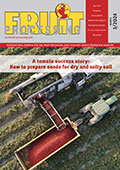Family-owned spirits company, Bacardi has successfully completed the world’s first commercial production of a glass spirits bottle fueled by hydrogen in a trial that took place in December 2023.
Bacardi worked with premium glassmaker, Hrastnik1860, to pioneer new technology that powered a glass furnace with hydrogen as its primary energy source and in doing so cut the Greenhouse Gas (GHG) emissions typically produced as a byproduct of glass bottle production.
The bottle, which for the purposes of the trial was the iconic ST-GERMAIN® elderflower liqueur bottle, is identical in appearance to the bottle produced using traditional methods and will reach bars and stores in the coming weeks.
Over the course of the trial, which produced 150,000 of the brand’s 70 cl glass bottles, hydrogen contributed more than 60 % of the fuel for the glass furnace, cutting GHG emissions by more than 30 %.
To achieve its ambition of becoming the most environmentally responsible global spirits company, Bacardi is continuously investing in new innovations and exploring opportunities to use pioneering new technology to help achieve its ultimate goal of Net Zero.
About Hrastnik1860
Hrastnik1860, a member of the Vaider Group, has more than 160 years of expertise in glass and is a global partner in the development and manufacturing of world-class engineered glass products. The company is known for creating technically demanding bottles, primarily for the spirits industry, and is a full-service solution partner—from R&D and consulting to innovative design, prototyping, manufacturing, decoration, and delivery. Hrastnik1860’s products are acclaimed for their perfect crystal shine and are entirely free of heavy metals. They range from traditional designs to innovative solutions that have won many prestigious awards.
Doehler, a global producer, marketer and provider of technology-driven natural ingredients, ingredient systems and integrated solutions for the food, beverage and lifescience & nutrition industry acquires Boon Flavors, located in Bangkok, Thailand, and strengthens its presence in Southeast Asia.
Doehler, a global producer, marketer and provider of technology-driven natural ingredients, ingredient systems and integrated solutions announces the acquisition of Boon Flavors, a renowned premium flavour house located in Bangkok, Thailand. As part of this acquisition, Boon Flavors will be known as Doehler Thailand going forward and be managed by its founder, Piya Boonnamkitsawad.
In 2018, Boon built a state-of-the-art flavour plant in Bangkok. Leveraging its proprietary technologies, the company has developed a great variety of local flavour tonalities that perfectly extends Doehler’s global taste portfolio. Boon will have access to all of Doehler’s cutting-edge taste technologies and, together with Doehler’s application labs in Indonesia and Thailand, global and local customers can expect to benefit from enhanced services and a more extensive product portfolio in the region.
Consumers are looking for exceptional sensory experiences in nutrition; superior taste, a perfect appearance and well-balanced mouthfeel play a significant role for consumers when choosing their products, ultimately guiding their preferences towards a better human nutrition.
Boon’s premium variety of local flavours, now integrated into Doehler’s global taste portfolio, contributes perfectly to this trend providing superior natural flavours to the food, beverage and lifescience & nutrition industry. This strategic acquisition further strengthens Doehler’s commitment to meeting the evolving needs of customers and consumers for excellent and remarkable tasty, healthy and sustainable solutions.
GNT has published externally verified data showing it reduced the average carbon footprint of its plant-based EXBERRY® Colouring Foods by 19 % in the first year of its sustainability plan. The company becomes the first colouring foods supplier to issue a Greenhouse Gas Verification Statement as it aims to become the leader in its field on sustainability.
The statement details GNT’s carbon footprint from 2019 to 2021. The auditor SGS verified the emissions data according to the internationally recognised ISO14064 standard, which includes emissions from carbon dioxide, methane, and nitrous oxide across six different reporting categories. As a result, the company can now provide comprehensive, benchmarked information on EXBERRY® Colouring Foods’ organisational footprint to customers.
In 2022, GNT announced that it plans to achieve a total of 17 sustainability targets over the course of the decade. These include cutting the environmental footprint for EXBERRY® product ranges by 25 % between 2020 and 2030 as well as reducing its factories’ CO2-equivalent emissions by at least 50 %. The new figures show the company is making significant progress toward those aims. Production volumes saw a double-digit increase between 2020 and 2021, but GNT’s overall carbon footprint remained flat. This meant the average footprint per kilogram of EXBERRY® Colouring Foods decreased by nearly a fifth over the course of the year.
Rutger de Kort, Sustainability Manager at GNT Group, said: “We’re committed to setting new standards on sustainability and the Greenhouse Gas Verification Statement highlights the work we’ve done so far. This external verification for our emissions data enables us to build trust and communicate our efforts in a truly transparent manner.”
The Greenhouse Gas Verification Statement shows GNT’s total carbon footprint dropped by 3,427 metric tons to 38,656 between 2019 and 2021. This is largely due to the use of green electricity at its production sites, which represents an important step in its efforts to reduce CO2-equivalent emissions at its factories by 50 %. The biggest contributors to GNT’s carbon footprint are direct emissions from natural gas and indirect emissions related to the purchase of heat and steam. Emissions related to purchased goods – such as raw materials, ingredients, and packaging – and waste streams are also important factors.
Rutger de Kort added: “The move to green electricity has delivered major improvements, but we need to go further to achieve our goals. Our main focus now is trying to end our reliance on gas to generate heat and steam. We’re already working on ways to electrify the process, including the use of industrial heat pumps and other new technologies, such as filtration. We’re also using the new data to identify further possibilities to cut our carbon footprint in areas including transportation and purchased goods.”
Suitable for almost any food and drink application, EXBERRY® Colouring Foods are made from non-GMO fruits, vegetables, and plants using physical processing methods. The crops are grown by farmers working as part of GNT’s vertical supply chain using sustainable methods.
Oterra, one of the world’s leading suppliers of natural colours with one of the widest portfolios in the industry is pleased to announce that the acquisition of India’s Akay Group is now complete. Oterra announced its intention to purchase Akay in July of 2022. Founded in 1995, Akay Group is a leading player in the natural colours and nutraceutical ingredients market.
This acquisition is the company’s fourth in under two years, and its first within the Asia Pacific region. Based in Kerala, India, Akay has four manufacturing sites in southern India that Oterra will add to its existing production network, as well as 400 employees who will join the team.
The acquisition further strengthens Oterra’s backwards integration, mainly in turmeric and paprika. It also provides a strong addition in the nutraceutical ingredients area and will allow the company to offer its customers and market partners a complimentary portfolio to its existing natural food colours solutions for dietary supplements.
The two companies have a long-standing connection. Oterra, previously known as Chr. Hansen Natural Colors, was in 1995, part of a joint venture with Akay to produce natural colours from turmeric and paprika. From 2007, Akay continued as an independent company, but Oterra and Akay kept close ties with each other since Akay was a key supplier to Oterra.
For many consumers, the desire to nurture and protect the environment has motivated the decision to follow a vegan diet. However, the ‘low carbon’ diet could potentially attract a greater following than veganism due its relatively more flexible approach to reducing the greenhouse gas emissions associated with our diets, says GlobalData, a leading data and analytics company.
In fact, when asked what they find to be an appealing food and drink claim, 60 %* of global consumers answered ‘low carbon footprint’, compared with 39 %* of global consumers who answered ‘vegan’.
Lia Neophytou, Consumer Analyst at GlobalData, says: “Whereas veganism does not permit the consumption of any animal or animal-derived products, the low carbon diet allows for the consumption of any food/drink items as long as they align with the broader goal of reducing the carbon emissions of one’s overall diet. This could include reducing meat and dairy consumption, increasing one’s intake of local foods, and reducing food and packaging waste.”
This diet also recognizes that not all vegan foods have a low carbon footprint. For example, exotic fruits which require importation from abroad. It is for this reason that Lele’s vegan café in London recently announced that it will no longer include avocado in its dishes to avoid ‘indirectly fuelling illegal deforestation and environmental degradation’.
The appeal of a low carbon diet therefore spans consumers who are already vegan and those who simply want to reduce their carbon footprint, hence its broader appeal.
Neophytou concludes: “In future, ‘low carbon’ certifications could become mainstream and serve as a way of verifying the environmental impact of food and drink. This goes beyond simply indicating the absence of animal or animal-derived products which vegan certifications signal.”
*GlobalData’s 2019 Q3 global consumer survey
The environmental benefits of SIGNATURE PACK from SIG have been confirmed by a critically reviewed ISO-conformant lifecycle assessment (LCA) – the world’s first for a mass balance product.
The SIGNATURE PACK from SIG is the world’s first aseptic carton pack linked to 100 % plant-based renewable materials. The LCA showed significant reductions in environmental impacts across all 10 categories as a result of the substitution of fossil-based polymers with mass balance plant-based polymers made from tall oil (a by-product of paper manufacturing).
The carbon footprint of SIGNATURE PACK is – on average across Europe – 66 % lower than the carbon footprint of a standard SIG 1-litre carton pack of the same format across its lifecycle, based on the Europe-wide LCA.
World’s first ISO-conformant LCA for a mass balance product
The polymers in SIGNATURE PACK are 100 % linked to plant-based material via a mass balance system, whereby plant-based raw materials are mixed in with conventional fossil raw materials to produce the polymers. The amount of plant-based material included in the mix is equivalent to the amount needed for the polymers used in SIGNATURE PACK and the totals are balanced through recognised and audited certification schemes to ensure strict traceability and accountability.
The SIGNATURE PACK LCA is the first ISO-conformant LCA to take into account the inclusion of materials via a mass balance system. LCAs are traditionally based on the physical contents of a product and the environmental impacts associated with each stage of its production.
The independent, critically reviewed LCA of SIGNATURE PACK was conducted in accordance with recognised international standards, ISO 14040 and ISO 14044 by the Institut für Energie und Umweltforschung (IFEU/Institute for Energy and Environmental Research) in Germany.
IFEU agreed to conduct the LCA when it became clear how valuable SIG’s mass balance approach could be in making mainstream polymer production more sustainable.
Driving more sustainable plastics
SIG chose a mass balance approach because it supports a wider transition from fossil to bio-based raw materials within the conventional and highly efficient polymer industry, instead of using niche small scale producers with a limited number of plastic grades.
The polymers are supplied by plastic producers, Sabic and BASF, using plant-based renewable material from European wood sources. Tall oil was selected as the feedstock because, as a by-product of paper production, it is a waste material rather than an agricultural crop that requires land and resources to grow.









